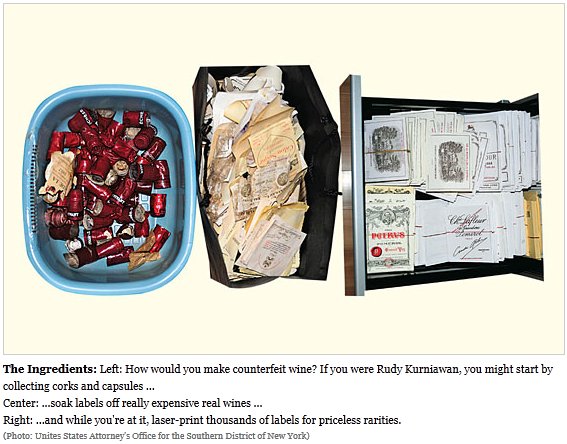Benjamin Wallace (who wrote the fascinating book The Billionaire’s Vinegar, mentioned here in connection with a lawsuit), has a lengthy article in New York magazine about shady practices in the rare wine business, and the even shadier practitioners:
Among a privileged set, though, Kurniawan’s quirks and résumé gaps were of much less interest than his generosity. After one tasting, Wasserman hailed him for having “poured the sickest lineup of wines I have ever had in one evening” and told him that “the scepter, the crown, the ermine cape is yours.” Meadows, too, became a beneficiary of Kurniawan’s largesse, through which he tasted wines even he had never encountered. Grateful, he took pains to field Kurniawan’s often arcane queries about labeling and capsule nomenclature. “I thought at the time, ‘Jesus Christ, he must take these bottles to bed,’ ” Meadows says. Soon, he was publishing tasting notes based on Kurniawan bottles, lending his blue-chip imprimatur to the young man and his wines. Robert Parker, the world’s most powerful wine critic, also drank them and pronounced Kurniawan “a very sweet and generous man.”
[. . .]
In October 2004, Kurniawan posted on Parker’s website under the header “Last weekend where I tried to kill John Kapon with legendary wines!!” He wrote about an extravagant four-day run in New York in which he and a group of wine lovers had gorged on priceless Bordeaux and Burgundy. Kurniawan had brought with him what seemed an inexhaustible supply of hyperrarities from a “magic cellar” — including two cases of the extremely rare 1945 Romanée-Conti—which he said he’d bought from a collector in Asia for $2 million. Every night, the group would drink from Kurniawan’s stash and then end up at Cru, the Greenwich Village restaurant with a 150,000-bottle wine list, which stayed open as late as 3 a.m. as Kurniawan ordered one expensive bottle after another off the list.

For instance, Kurniawan didn’t mention the five FedEx packages he received from Cru that year, containing the empty bottles from his wild nights at the restaurant. It wasn’t unusual for a customer to take away a memorable bottle after it was spent. But over the course of Cru’s six-year run until it closed in 2010, no other customer ordered as many bottles and then systematically claimed the empties. Kurniawan was building a bottle museum in his garage, he explained to the sommelier.
Though Kurniawan presented himself publicly as a mere wine lover, a buyer and not a seller, by the time he made his splash on the wine boards, he was already consigning at auction. And problems had cropped up. As early as 2003, Internet entrepreneur Eric Greenberg was threatening to sue online auction site Winebid over some “suspect/bad mags,” e-mailing, “My goal is to bury the consignor’s reputation in the wine world.” Soon after, he reported that he had spoken to the consignor, Rudy Kurniawan, and was convinced that he, too, had been duped by whoever sold him the wine.
H/T to Bob Tarantino for the link.



